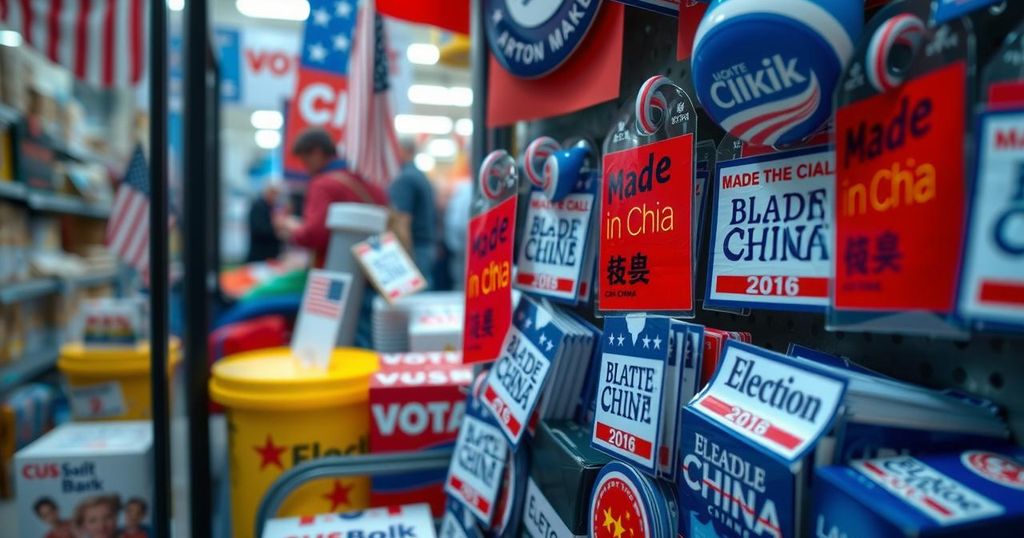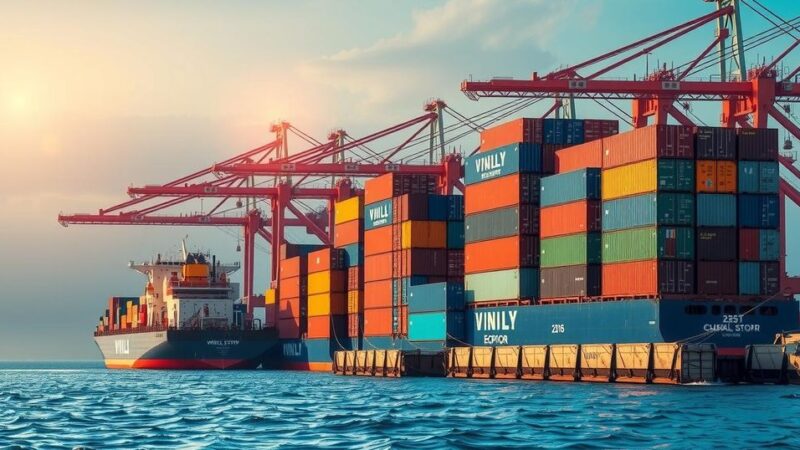As the U.S. presidential election approaches, a growing number of voters are purchasing campaign merchandise, much of which is made in China. E-commerce platforms have led to an influx of inexpensive goods that significantly undercut the prices of American-made products. This trend poses challenges for domestic manufacturers, who emphasize the importance of local production standards and the impact of policies like the de minimis loophole, which allows low-cost goods to enter the market without duties. Experts highlight the contradiction of supporting American candidates while purchasing foreign-made products, raising concerns about the future of American manufacturing.
As the United States presidential election approaches its conclusion, voters increasingly showcase their preferred candidates through a variety of campaign merchandise. However, many may be unaware that items such as the “Make America Great Again” hats or “Childless Cat Lady for Harris” T-shirts they don can likely be sourced from China. Thanks to the rise of e-commerce platforms, Chinese merchants are inundating the American market with inexpensive election-themed goods, creating significant challenges for domestic producers who are struggling to maintain competitiveness. Ben Waxman, co-founder of American Roots, an apparel company based in the United States, emphasized the growing impact of foreign-made merchandise on local businesses. “I think the amount of stuff on Amazon and Etsy that’s coming from China and other countries in cargo ships and unloaded on American shores is drastically impacting American manufacturers’, like myself, ability to compete and grow our own business. I think it’s dramatic,” he remarked. Waxman noted that his company’s U.S.-produced campaign T-shirts retail around $15 each, while similar products available through Chinese platforms like Temu may cost as little as $3. He underscored the rationale behind the disparity in pricing, stating, “It’s more expensive when you pay higher wages, living wages, and abide by environmental standards.” A comprehensive analysis of total sales figures for domestically produced versus Chinese-made election merchandise remains elusive. Nonetheless, a significant quantity of foreign-produced items is readily accessible on e-commerce sites. For instance, on Temu, a myriad of election-themed products is available at shockingly low prices, including a “Make America Great Again” hat costing under $4, compared to the official campaign’s retail price of $40. Furthermore, Kim Glas, president of the National Council of Textile Organizations, indicated that the rampant abuse of the de minimis loophole—allowing goods valued under $800 to enter the U.S. sans import duties—has negatively impacted the domestic industry. Glas noted, “We lost 21 manufacturing operations over the last 18 months,” highlighting a decline in campaign product sales this electoral cycle compared to previous years. Despite inquiries, neither Amazon nor eBay provided comments regarding their policies on Chinese vendors or the amount of election merchandise imported into the United States. In contrast, Temu’s representative attributed its expansion not to the de minimis policy but to its operational efficiencies. The stark contradiction of two presidential candidates advocating for trade reforms while their supporters purchase foreign-made merchandise reflects the complexity of American consumer habits. Mitch Cahn, president of Unionwear, reflected on this paradox, stating, “If someone is supporting a candidate because of that candidate’s economic policy and their position toward improving our economy and improving our environment and improving our labor conditions… and then they’re supporting a candidate by buying a product that’s made in a country that stands for the opposite of that, they’re actually doing themselves and the candidate and the economy a disservice.” The landscape is further complicated by the fact that anyone can easily produce campaign merchandise; official campaigns do not restrict the use of their names and branding. Additionally, the Associated Press reported that many campaign materials, including thousands of Trump’s “God Bless America” Bibles, are also manufactured in China, casting doubt on previous assertions of supporting domestic industries. Experts like Chris Tang, a professor of business administration at UCLA, highlighted that while the influx of Chinese products may contribute to job losses in manufacturing, it also offers opportunities for small businesses to source election merchandise affordably and efficiently via platforms like Alibaba. In advocating for a robust American manufacturing sector, Tang suggested a shift towards producing high-value products over lower-cost items, such as standard election merchandise. Ultimately, the election merchandise market provides a microcosm of larger trade dynamics, revealing the fine balance between consumer demand for affordability and the economic implications of relying on foreign production.
The surge of American voters displaying political merchandise as the presidential election nears its conclusion has uncovered a significant trend: a substantial portion of this merchandise is manufactured in China. As e-commerce grows and Chinese traders flood the market with low-cost products, American manufacturers face increasing difficulty in competing due to the clear disparity in pricing and production methods. This article explores the implications of this trend on domestic businesses and the broader U.S. economy, including the impact of trade policies and consumer behavior. Furthermore, it highlights the irony of political candidates advocating for domestic manufacturing while their supporters buy foreign-made products, raising questions about the political and economic impact on American manufacturing and consumer preferences.
The increasing prevalence of Chinese-made election merchandise in the U.S. market raises critical questions regarding consumer choices, domestic manufacturing, and trade policies. As American manufacturers struggle to compete with low-cost goods from China, the underlying economic and political implications become increasingly apparent. The apparent disregard for supporting local industries while endorsing candidates who profess to prioritize domestic production presents a paradox that could have far-reaching effects on the U.S. economy. This situation reflects the need for a concerted effort to reinforce domestic manufacturing and reconsider the dynamics between consumer choices, political advocacy, and economic policies. Overall, the situation calls for deeper contemplation about the consequences of purchasing habits and their alignment with American values and objectives.
Original Source: www.voanews.com






